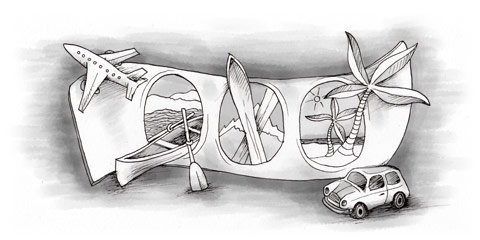Car owners must annually renew registration and have their cars inspected. Your local Bureau of Motor Vehicles typically sends you a notification before the car's license expires. The Bureau's notification includes registration renewal forms. If they fail to notify you or send you the correct forms at the proper time, contact your local Bureau.
To renew registration, certified local mechanics will test brakes, alignment and lights. They will stamp your registration renewal forms, which you must send back to the local Bureau of Motor Vehicles.
Importing a car to Israel
Car dealerships will import a new car to Israel for you. You will need to specify the model of car you want and any luxury gadgets. After you give the specifications of the car to your dealer, your dealer will usually ask you to pay an advance deposit. Be prepared to wait because Customs will take its time inspecting your car.
Once the car arrives and clears Customs inspections, your dealer will release the car to you between three and ten days. You have to take your driver's license and immigration or residency card to the dealer. Upon release, the dealer gives you a license number and registration.
Buying or selling a used car
In any used car sale, you must have a transfer of property form. Both the buyer and the seller must sign this form to make sure the car is transferred to the buyer. The transfer of property form must be registered with local authorities. Banks and post offices perform this service for a small fee. If the sale is not registered, the car still officially belongs to the seller. The seller will receive registration notifications and insurance bills for the sold car.
Car insurance in Israel
The government requires that all car owners have insurance. The National Insurance Institute offers two types of car insurance: compulsory and full-coverage. Compulsory car insurance (chova) covers all bodily injuries received in an accident. You, your passengers and pedestrians are included in this insurance. The model of your car and your driving history determine how much compulsory insurance you pay.
The government also offers full-coverage insurance (makti). This covers most damages done to your car and also covers all bodily injury received in an accident.
Renting a car
If you do not want to or cannot have your own car in Israel, you might want to rent a car from time to time instead. Tourists and residents alike may rent cars if they have a valid driver's license. An international driver's license is not required to drive a car in Israel. Car rental agencies will rent cars to foreigners who are are 21 and present a valid driver's license.
Driving tips and information
The steering wheel is located on the left side of the car, and cars drive on the right side of the road. Road signs are printed in English, Hebrew, and Arabic.
All highways are numbered. Even-numbered roads run north and south. Odd-numbered roads run east and west. Talking on a mobile phone while driving is illegal.

